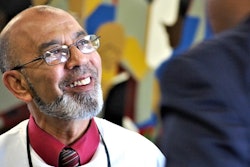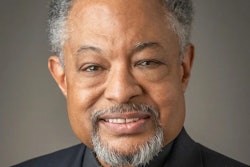Legislators Told Health Budget Should Target People of Color
Republicans in Congress are talking about a multibillion dollar increase to double funding on health research next year. A Howard University professor is trying to ensure that healthcare programs for people of color get a similar increase.
A doubling of the National Institutes of Health (NIH) budget would open new opportunities for healthcare research, Gary Dennis, M.D., chief of neurosurgery at Howard University College of Medicine, told a congressional subcommittee.
But lawmakers also then have a “historic opportunity” to increase funding for minority health research and recruit more health professionals of color, added Dennis, who is also president of the National Medical Association that represents 20,000 African American physicians. In fact, Dennis said, it is “entirely appropriate” to use a significant amount of that NIH increase specifically to address racial disparities in healthcare.
“If Congress and the administration are at all serious about the national commitment to eliminate racial and ethnic health disparities, these programs must receive a minimum increase that is at least proportionate to the increased funding received by NIH,” he told the legislative audience.
Before the House Appropriations Committee, Dennis outlined several key health priorities, urging Congress to:
n Reject the president’s proposed $50 million cut in federal support for health professions education, and instead provide an increase above the current $302 million. “Each one of the health professions training programs affects minorities,” and cutbacks would adversely affect the ability of minorities to pursue healthcare careers, Dennis said.
n Triple funding for the government’s racial and ethnic health disparities initiative. Currently funded at $10 million, the program “must receive significant increases in funding,” said Dennis, who recommended $35 million for a second phase of the initiative.
n Provide a 6 percent funding increase for the Office of Minority Health at the Department of Health and Human Services, and raise the office’s visibility inside and outside government.
n Fund a national study on racism in medicine, particularly issues related to medical education and healthcare delivery.
Dennis noted that African Americans represent 12 percent of the nation’s population but just 2 percent of medical professionals.
“A clear understanding of the extent to which racism is ingrained in the practice of medicine and the education of health professions students is absolutely essential to the effort to eliminate health disparities by 2010,” he said.
Greater attention to healthcare for the uninsured and community-based public health initiatives are other priorities Congress should address this year, he said. The issue will come before lawmakers when they craft a health care spending plan for the fiscal year that begins Oct. 1.
Bill to Help D.C. Students,
UDC Faces Delay in Senate
Legislation to upgrade the status of the University of the District of Columbia and help more D.C. students afford college has moved one step closer to enactment. However, concerns about potential costs may delay further action.
The House of Representatives in late May approved a bipartisan bill to grant UDC designation as a historically Black college and university. The university opened in 1977 following a merger of three institutions with considerably longer histories of serving African American students.
If enacted into law, the plan would give UDC access to Title III Higher Education Act funds through a new pot of money, which would not alter Title III funding for existing HBCUs.
Another provision of the bill, H.R. 974, would allow District students to receive in-state tuition rates at any state public higher education system nationwide. Sponsors say the plan is needed because D.C. students lack access to the typical four-year public university system available to youth in other states. UDC, though it offers four-year degrees, is an open-admissions institution.
“The same choices and opportunities simply do not exist for students and parents here as exist elsewhere in the United States,” said Rep. Tom Davis (R-Va.), the legislation’s main sponsor.
Davis worried that as a result of the lack of choice, families may move out of the District or leave the area to access these educational opportunities. The bill, he said, “helps level the playing field for D.C. graduates.”
Del. Eleanor Holmes Norton (D-D.C.) also helped draft the bill, including its UDC provisions.
“This bill in and of itself will encourage youngsters to go to college in the first place who simply would never have tried, despite their qualifications,” she says.
The House approved the bill by voice vote, but a new obstacle — cost — is emerging in discussions on the other side of Capitol Hill. The bill requires the federal government to reimburse state colleges and universities for the difference between what D.C. students would have paid as out-of-state students and amounts they will pay under the new “in-state” classification. The Clinton administration initially pegged the program’s cost at $17 million a year, but some critics say the program could grow to 10 times that level.
As a result, the GOP leader of the Senate education committee has a more streamlined bill with tougher eligibility requirements and in-state tuition access only to public colleges and universities in Maryland and Virginia.
The proposal from Sen. James Jeffords (R-Vt.) would limit in-state tuition rates only to low- and middle-income District families. The Davis-Norton bill carries no such eligibility rules.
Under the Jeffords plan, students would become eligible for in-state tuition benefits if they earn less than $40,000 to $50,000 in a one-parent family or up to about $80,000 in a two-parent family — the same eligibility criteria used for the federal HOPE Scholarship enacted in 1997.
Other senators want to tighten eligibility and residency requirements. Under the House bill, critics say, students at the District’s private colleges — including Georgetown, George Washington, and Howard universities — could become eligible for the program after their freshman years because they could meet the House bill’s one-year District residency requirement.
But GOP senators emphasize that they support some type of expansion of higher education aid to D.C. students.
“District of Columbia high school students need a broader horizon of more affordable public colleges and universities,” says Sen. John Warner (R-Va.), a co-sponsor of Jeffords’ bill.
Jeffords’ bill also includes aid for UDC of up to $20 million annually. The institution could use the funds for purposes under Title III, including acquisition of library equipment, renovation and construction of facilities, faculty exchange, academic instruction, tutoring, counseling, and student activities.
Owens Bill Seeks Education Investment
With a government surplus some peg as high as $100 billion, Rep. Major Owens (D-N.Y.) wants Congress to devote a large chunk of this money to education.
“Washington is bloated with rhetoric about education reform,” says the Congressional Black Caucus member. “But when we examine the actual programs and projects being proposed, there is a tremendous shortfall between the giant needs and the tiny proposed solutions.”
Owens’ new bill, H.R. 1820, would change that trend in a major way — through $22 billion in annual education aid. His plan would provide funds to states based on their percentage of the nation’s school-age population. Top priorities for funds would go to school repairs, construction and modernization to accommodate new technology, enrollment increases, and student safety issues.
The nation’s schools need about $112 billion just for repairs, Owens says, plus additional funds to deal with burgeoning enrollments.
“The opportunity to learn begins with a safe, conducive school building,” he says.
Owens’ plan joins dozens of other reform efforts during a year in which Republican leaders say little new money may be available for education programs because of budget caps on domestic spending. H.R. 1820 was referred to the Education and the Workforce Committee.
© Copyright 2005 by DiverseEducation.com





















